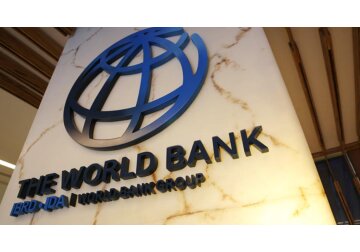
The World Bank forecasts record food and fuel prices due to Russia's invasion of Ukraine.
This is stated in the World Bank's latest Commodity Markets Outlook. It notes that the war in Ukraine has dealt a serious blow to commodity markets, changing global trade, production and consumption patterns so that prices will remain at historically high levels until late 2024. It stresses that energy price increases over the past 2 years were the largest since the 1973 oil crisis. The rise in prices for food products, whose major producers are Russia and Ukraine, as well as fertilizers, whose production uses natural gas, was the most substantial since 2008. "Overall, this amounts to the largest commodity shock we’ve experienced since the 1970s. As was the case then, the shock is being aggravated by a surge in restrictions in trade of food, fuel and fertilizers," said Indermit Gill, World Bank’s vice president for equitable growth, finance, and institutions. Energy prices are expected to rise by more than 50 percent in 2022 and decline between 2023 and 2024. Non-energy commodity prices, including agricultural products and metals, are projected to rise nearly 20% in 2022, and slow down in subsequent years as well. Nonetheless, commodity prices are expected to remain much higher than the average of the past 5 years. In the event of a prolonged war or additional sanctions against Russia, price levels and volatility could be even higher than current forecasts. Due to trade and production disruptions caused by the war, Brent crude oil prices are expected to average $100 per barrel in 2022, the highest level since 2013 and up more than 40% from 2021. Prices are expected to fall to $92 in 2023, well above the 5-year average of $60 per barrel. Natural gas prices (in Europe) are expected to double in 2022 compared to 2021, and coal prices are expected to increase by 80%, with both prices reaching historic highs. Wheat prices are projected to rise by more than 40%, reaching record levels this year in nominal terms. This will put pressure on developing economies that depend on grain imports, especially from Russia and Ukraine. Metals prices are projected to rise by 16% in 2022, then fall in 2023, but remain at high levels. A special thematic section of the WB report provides an in-depth examination of the impact of the current war on commodity markets. It also examines the response of commodity markets to similar shocks in the past. The analysis shows that the impact of the current war may be more lasting than previous shocks for at least two reasons. First, there is now less scope for substituting other fossil fuels for the hardest-hit energy commodities, as rising prices have affected all fuels. Second, higher prices for some commodities also lead to higher prices for other commodities: high natural gas prices have led to higher fertilizer prices, pushing up agricultural commodity prices. Moreover, policy responses so far have focused more on tax cuts and subsidies (which often exacerbate supply shortages and price pressures) than on long-term steps to reduce demand and find alternative sources of supply. War also leads to more costly patterns of trade, which can provoke longer-term inflation. The war is expected to lead to major changes in energy trade. For example, some countries will now look for coal supplies in more remote areas. At the same time, a number of major coal importers may increase coal imports from Russia. This diversion is likely to lead to higher costs, since it involves long transportation distances and coal is a bulky and expensive commodity to transport. Similar changes are occurring in the natural gas and oil markets. In the near term, higher prices threaten to disrupt or delay the transition to cleaner forms of energy. Several countries have announced plans to increase fossil fuel production. High metal prices are also making renewable energy more expensive, which depends on metals such as aluminum and nickel for battery production. The report asks policymakers to act immediately to minimize the damage to their citizens and to the global economy. It calls for targeted social safety net programs, such as cash benefits, school feeding programs, and public works programs, instead of food and fuel subsidies. Investments in energy efficiency, including insulation of buildings, should be a key priority. The report also calls on countries to accelerate the development of zero-carbon energy sources, such as renewable energy. // 27.04.2022 – InfoMarket







